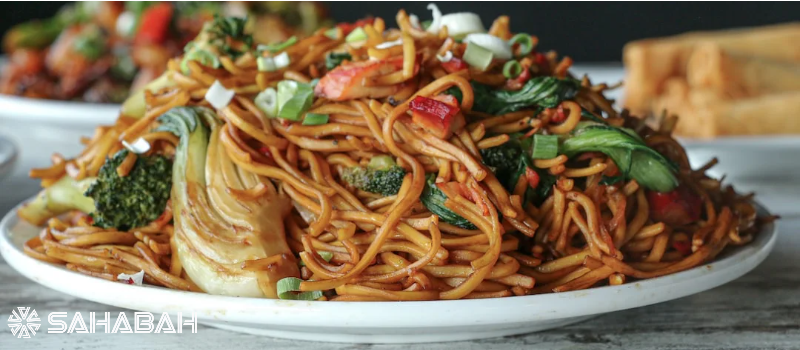Jajangmyeon, also known as jjajangmyeon, is an iconic Korean noodle dish that has become popular worldwide. With its tasty combination of chewy noodles, savory black bean sauce, and a variety of colorful vegetables, this Korean comfort food is a favorite for many. But can Muslims enjoy this delicious noodle dish too? Is jajangmyeon halal?
A Brief History of Jajangmyeon and Why It’s So Popular
Jajangmyeon has its origins in Chinese cuisine but became uniquely Korean after being adapted by Korean chefs. The dish was first introduced in Korea by Chinese immigrants during the Joseon dynasty in the late 1800s. At that time, many Chinese people migrated to the Incheon port city in Korea seeking opportunity. As they settled in Korea, they naturally brought their food culture along with them.
One such dish was jajangmyeon, originating from China’s Shandong province. Known as zhajiangmian in Chinese, it consisted of wheat noodles topped with a thick sauce made of chunjang, or fermented black soybean paste. When Korean locals tasted this noodle dish with its rich, savory black bean sauce, it quickly grew popular.
However, Koreans customized it to suit their tastes. They added a variety of crunchy vegetables like zucchini, carrot, onion, and cabbage for texture and color. Over time, jajangmyeon transitioned from a Chinese noodle dish to a uniquely Korean one. Today, jajangmyeon is considered one of Korea’s national dishes, along with kimchi and bulgogi. Though it came from China originally, Koreans have truly made jajangmyeon their own.
So what makes this noodle dish so crave-worthy that it has become a Korean staple? Here are some of the main components that give jajangmyeon its iconic flavor:
-
Noodles: Jajangmyeon is usually made with fresh wheat flour noodles. Korean noodles have a distinctly chewy, bouncy texture that pairs perfectly with the thick black bean sauce coating each strand. Sometimes ramen noodles, udon noodles, or even spaghetti can be used too. But traditional Korean jajangmyeon noodles are essential for authentic flavor.
-
Chunjang sauce: This savory black bean paste sauce made from fermented soybean paste gives jajangmyeon its signature dark brown color and rich, complex flavor. Chunjang sauce has an umami, slightly sweet yet salty taste that Koreans can’t get enough of. The sauce clings nicely to the slippery noodles.
-
Vegetables: Popular vegetables mixed into jajangmyeon include zucchini, potato, carrot, onion, cucumber, and cabbage. They provide crunch and visual appeal while balancing the robust black bean sauce. The vegetables are typically julienned into long strips or diced before being briefly stir-fried.
-
Pork: Traditional Korean jajangmyeon almost always contains fatty pork like diced pork belly. The tender pork provides a meaty texture and savory flavor that melds with the other ingredients. For halal jajangmyeon, the pork can be omitted.
-
Aroma: Garlic, ginger, green onions, and sesame oil are added during cooking to give jajangmyeon an appetizing aromatic quality. This makes the dish seem even more flavorful.
With the perfect interplay of tastes, textures, and aromas from the noodles, black bean sauce, vegetables, and pork, it’s easy to understand why jajangmyeon has become so beloved in Korea and globally. The customizable combination of ingredients allows for many variations of the dish as well.
Korean Black Bean Noodles Goes Global
While jajangmyeon originated in Korea, this iconic noodle dish has also spread around the world in recent decades. Here are some of the places that have embraced jajangmyeon:
-
China: Jajangmyeon has become trendy in China again too, especially among youth. The black bean sauce is a bit sweeter compared to the Korean version. Jajangmyeon chains from Korea have found success in China.
-
United States: In cities with large Korean populations like Los Angeles and New York, jajangmyeon is served at many Korean restaurants and food trucks. Non-Korean diners are also trying and enjoying this exotic noodle dish.
-
Japan: Jajangmyeon is also common in Japan, with their own localized twist. It is frequently served with a fried egg or seafood like squid.
-
Singapore and Malaysia: In these countries with sizable Chinese and Korean communities, jajangmyeon is a popular menu item at Asian noodle eateries and food courts.
-
Philippines: With Korea’s cultural influence, jajangmyeon has made its way to Filipino restaurant menus and fast food chains like Jollibee.
The global reach of K-pop culture has also sparked interest in Korean food like jajangmyeon, especially among young people worldwide. From Seoul to New York City, you can satisfy a jajangmyeon craving these days.
Is Jajangmyeon Halal?
Now onto the main question – can Muslims enjoy this iconic Korean noodle dish? Let’s explore the key factors that determine if jajangmyeon meets halal requirements according to Islamic law:
Ingredients
The ingredients in jajangmyeon must be analyzed closely to check if they are halal-compliant:
-
Noodles: Wheat noodles and egg noodles typically used for jajangmyeon are halal. But packaged instant ramen noodles may contain non-halal ingredients like pork-based flavorings. Check the label carefully.
-
Chunjang paste: Most Korean black bean paste contains just fermented soybeans, flour, and caramel coloring with no alcohol or pork, meeting halal standards. However, some brands may add flavorings that contain haram ingredients not suitable for Muslims. Confirm with the manufacturer before purchasing any packaged chunjang sauce.
-
Vegetables and fruits: Fresh vegetables like zucchini, carrot, onion, potato and cucumber are inherently halal. Some recipes may also add apples, pears or other fruits to balance the richness.
-
Meat: Pork is haram and clearly not permitted in halal jajangmyeon. Substituting beef, chicken or seafood like squid, shrimp or clams makes the dish permissible for Muslims.
-
Seasonings: Soy sauce often contains alcohol, which would be considered haram. Use soy sauce substitutes like halal-certified tamari or coconut aminos. Other seasonings like sesame oil, garlic, ginger, salt, gochugaru chili flakes and black pepper are halal.
As long as alcohol and pork are avoided when preparing or ordering jajangmyeon, the dish can meet halal standards. It is crucial to verify packaged ingredients by reading labels carefully and contacting manufacturers regarding haram additives. With some modifications, the dish can be customized to remain halal.
Cooking Process
For the actual cooking process, jajangmyeon preparation typically does not involve any non-halal methods:
- The wheat or egg noodles are simply boiled in water until just tender.
- The proteins and vegetables are stir-fried or sauteed in vegetable oil over high heat for a few minutes.
- The chunjang sauce is prepared by cooking down the paste in water or broth on the stovetop until thickened.
- Finally, the cooked noodles and stir-fried ingredients are tossed together in the savory black bean sauce before serving.
As long as shared cooking equipment and surfaces are thoroughly cleaned to prevent cross-contamination, the jajangmyeon cooking process remains halal compliant.
Restaurant Serving Practices
When enjoying jajangmyeon from a restaurant in Korea, caution should be taken regarding their serving practices:
-
Request the noodles and jajang sauce to be served separately from any haram meats on the menu, like pork bulgogi.
-
Inquire if alcohol is used in the chunjang sauce or soy sauce. Ask if they can make substitutions to avoid alcohol.
-
Clarify whether any pork-based stocks or oils are used in cooking the jajangmyeon or anywhere in the kitchen. Cross-contamination could occur if pork touches the dish.
-
Verify that separate cooking equipment is used to prepare halal jajangmyeon to avoid mixing with haram ingredients.
-
Check if the same fryer is used to cook different meat types. Pork and halal meats should never mix.
With proper precautions, Muslims can still enjoy the signature jajangmyeon dining experience at many restaurants in Korea. Do research to find halal-friendly establishments.
Tips for Making Halal Jajangmyeon Noodle at Home
Here are some recommendations for preparing delicious and halal-compliant jajangmyeon in your own kitchen:
-
Purchase fresh halal wheat or egg noodles, available at Korean grocery stores or online shops catering to Muslims. You can also make your own noodles from scratch for full control.
-
Use a Muslim-friendly brand of chunjang paste, easily found at halal Korean food stores or websites. Verify no haram additives are in the ingredient list.
-
For the protein, thinly slice halal beef sirloin or flank steak. Chicken breast or thigh sliced thin works too. Seafood options include shrimp, squid, mussels or clams.
-
Chop up a colorful array of fresh vegetables like zucchini, potato, carrots, onion, cabbage, mushrooms and cucumber. The more textures and colors, the better.
-
Season with halal-certified tamari or coconut aminos instead of soy sauce. Add minced garlic, grated ginger, sesame oil, salt, white or black pepper, and gochujang chili paste for some spice.
-
Stir-fry the proteins and vegetables separately in a skillet or wok with a bit of oil on high heat until cooked through and lightly browned in spots.
-
Make the chunjang sauce by dissolving the paste in chicken or vegetable broth until smooth. Simmer until slightly thickened.
-
Mix the cooked noodles, stir-fried ingredients, and chunjang sauce all together in a pan or bowl. Adjust seasoning if needed.
-
Garnish with sliced green onions, toasted sesame seeds, and a dash of sesame oil before serving.
Making your own customized halal jajangmyeon gives you control over the ingredients while still yielding amazingly flavorful results. Get creative with health-conscious substitutions too!
Where to Find Halal Jjajang myeon in Korea
While homemade is an option, you can also dine out for halal-friendly jajangmyeon from the growing number of restaurants in Korea catering to Muslim patrons:
-
Halal Guys – This popular halal Korean food chain with several locations offers jajangmyeon prepared according to Islamic guidelines.
-
Halal Heaven – Muslim-owned restaurant located in the Itaewon district of Seoul serving authentic halal Korean food, including jajangmyeon.
-
Al Baik – Top halal Korean fried chicken restaurant chain with franchises across Korea. They have jajangmyeon meals made with halal ingredients.
-
Saamlip Halal Grill – Korean BBQ restaurant catering to Muslims, with halal-certified jajangmyeon on the menu.
-
Korean Halal Food – Muslim Korean food delivery service that can provide customizable halal jajangmyeon.
Thanks to increasing demand, jajangmyeon cravings can be satisfied at many dining establishments following Islamic dietary regulations. Do your research to find restaurants using halal practices.
Conclusion On Jjajangmyeon
From the ingredients to preparation methods and sourcing options, jajangmyeon can potentially meet halal standards for Muslims while retaining its appetizing flavors. By omitting alcohol and pork, using Muslim-friendly chunjang paste, and incorporating tasty vegetables and halal proteins, this classic Korean dish can be customized for Islamic dietary needs. With proper precautions, Muslims can savor jajangmyeon just as much as anyone else.





